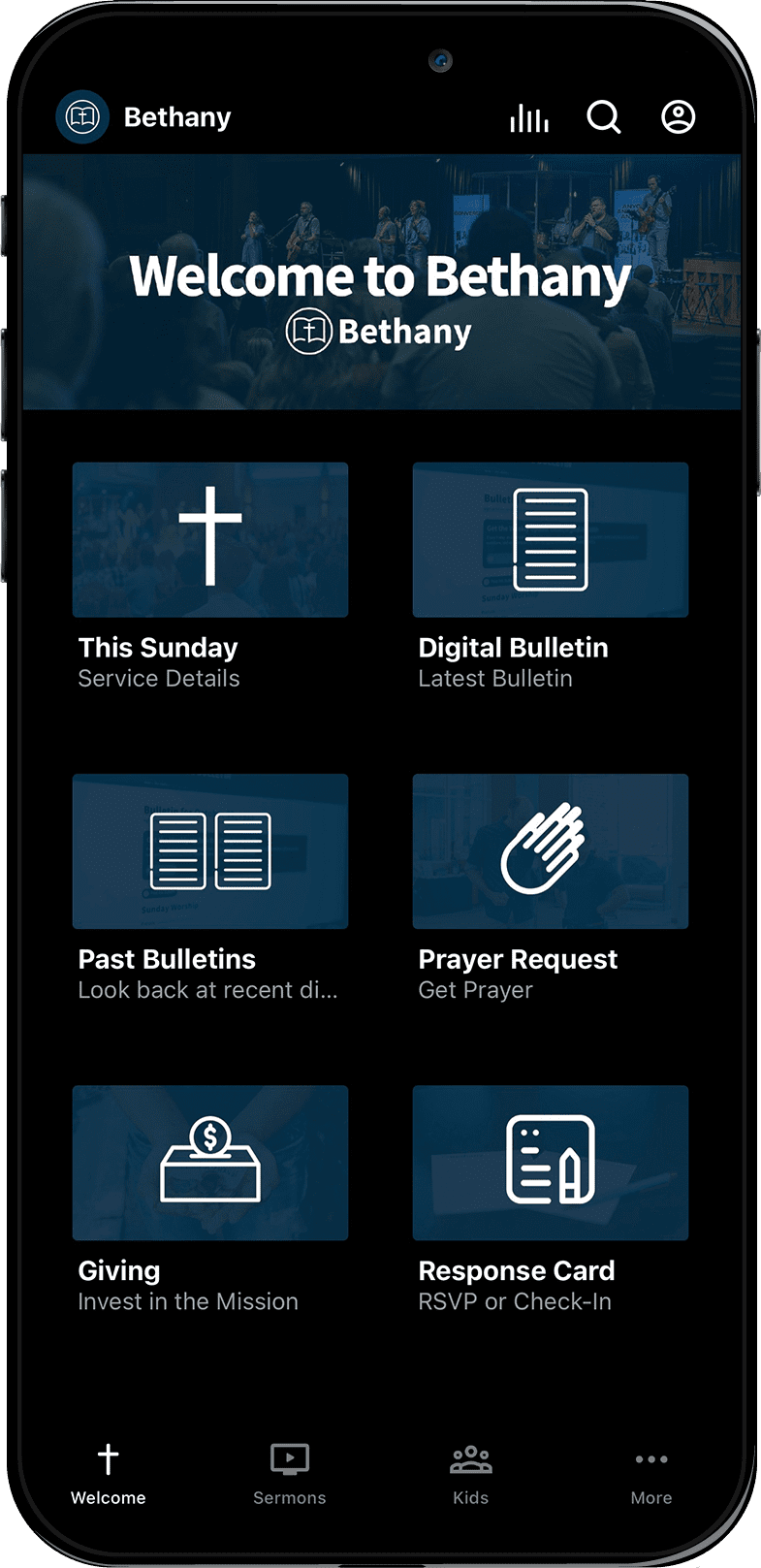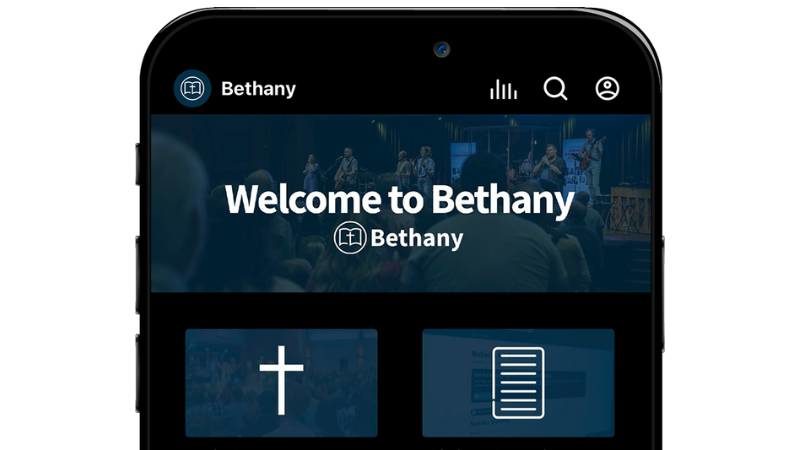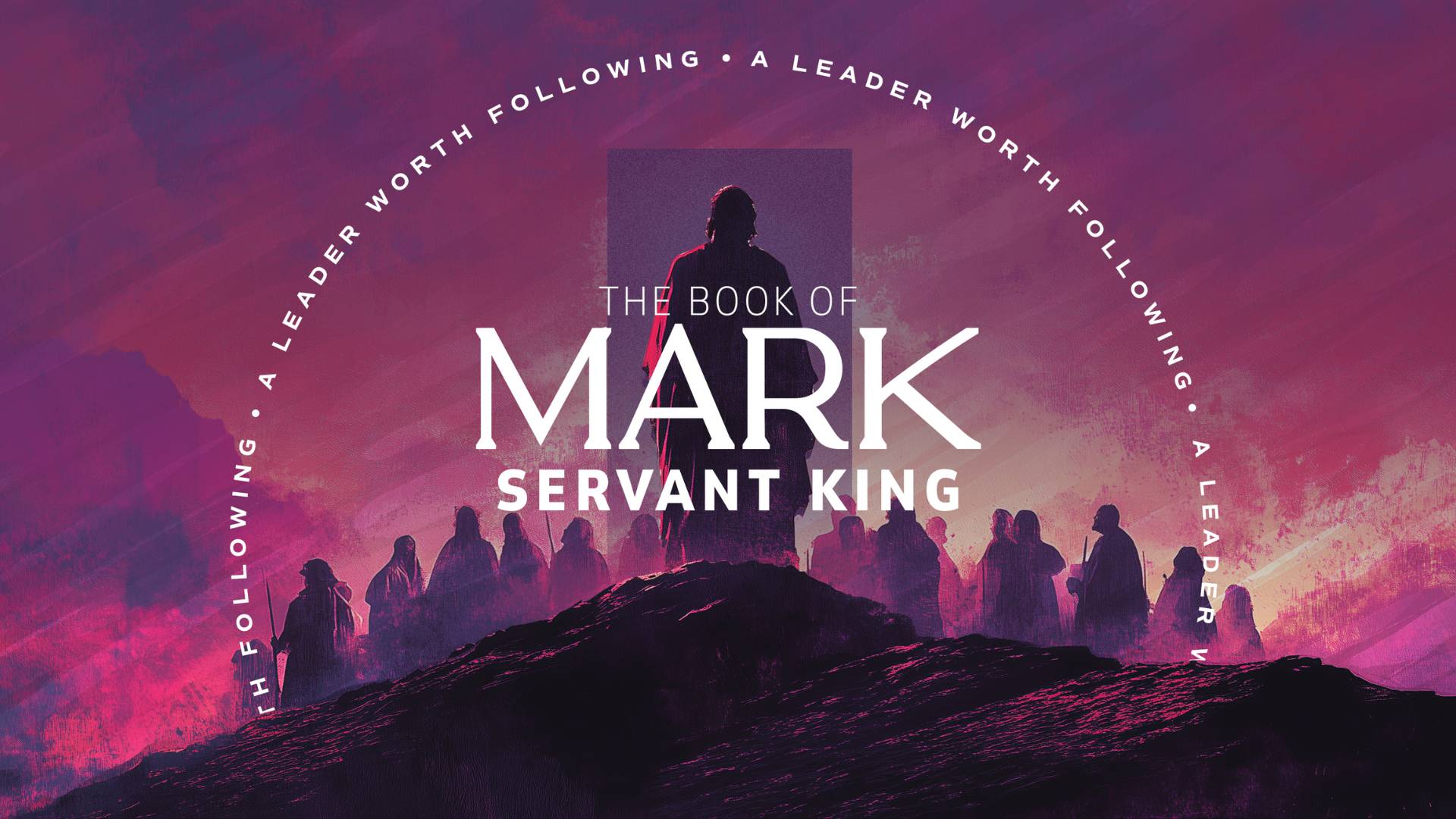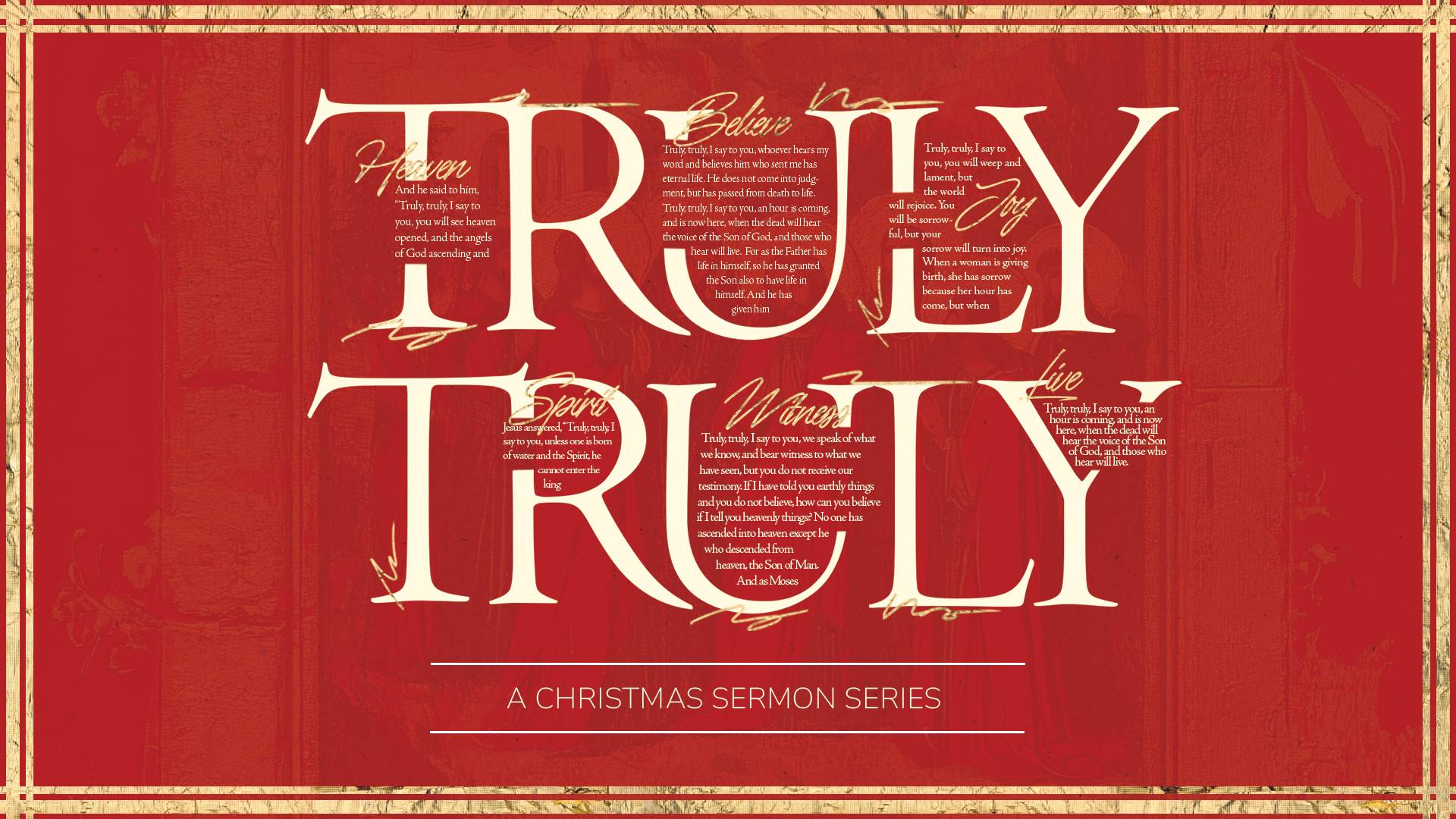In This Series
The Old Testament Takes the Stand
Acts 7:1-53 (ESV)
April 18, 2021
Pastor Daniel Sheaffer
1 And the high priest said, “Are these things so?” 2 And Stephen said: “Brothers and fathers, hear me. The God of glory appeared to our father Abraham when he was in Mesopotamia, before he lived in Haran, 3 and said to him, ‘Go out from your land and from your kindred and go into the land that I will show you.’ 4 Then he went out from the land of the Chaldeans and lived in Haran. And after his father died, God removed him from there into this land in which you are now living. 5 Yet he gave him no inheritance in it, not even a foot’s length, but promised to give it to him as a possession and to his offspring after him, though he had no child. 6 And God spoke to this effect—that his offspring would be sojourners in a land belonging to others, who would enslave them and afflict them four hundred years. 7 ‘But I will judge the nation that they serve,’ said God, ‘and after that they shall come out and worship me in this place.’ 8 And he gave him the covenant of circumcision. And so Abraham became the father of Isaac, and circumcised him on the eighth day, and Isaac became the father of Jacob, and Jacob of the twelve patriarchs.
9 “And the patriarchs, jealous of Joseph, sold him into Egypt; but God was with him 10 and rescued him out of all his afflictions and gave him favor and wisdom before Pharaoh, king of Egypt, who made him ruler over Egypt and over all his household. 11 Now there came a famine throughout all Egypt and Canaan, and great affliction, and our fathers could find no food. 12 But when Jacob heard that there was grain in Egypt, he sent out our fathers on their first visit. 13 And on the second visit Joseph made himself known to his brothers, and Joseph’s family became known to Pharaoh. 14 And Joseph sent and summoned Jacob his father and all his kindred, seventy-five persons in all. 15 And Jacob went down into Egypt, and he died, he and our fathers, 16 and they were carried back to Shechem and laid in the tomb that Abraham had bought for a sum of silver from the sons of Hamor in Shechem.
17 “But as the time of the promise drew near, which God had granted to Abraham, the people increased and multiplied in Egypt 18 until there arose over Egypt another king who did not know Joseph. 19 He dealt shrewdly with our race and forced our fathers to expose their infants, so that they would not be kept alive. 20 At this time Moses was born; and he was beautiful in God’s sight. And he was brought up for three months in his father’s house, 21 and when he was exposed, Pharaoh’s daughter adopted him and brought him up as her own son. 22 And Moses was instructed in all the wisdom of the Egyptians, and he was mighty in his words and deeds.
23 “When he was forty years old, it came into his heart to visit his brothers, the children of Israel. 24 And seeing one of them being wronged, he defended the oppressed man and avenged him by striking down the Egyptian. 25 He supposed that his brothers would understand that God was giving them salvation by his hand, but they did not understand. 26 And on the following day he appeared to them as they were quarreling and tried to reconcile them, saying, ‘Men, you are brothers. Why do you wrong each other?’ 27 But the man who was wronging his neighbor thrust him aside, saying, ‘Who made you a ruler and a judge over us? 28 Do you want to kill me as you killed the Egyptian yesterday?’ 29 At this retort Moses fled and became an exile in the land of Midian, where he became the father of two sons.
30 “Now when forty years had passed, an angel appeared to him in the wilderness of Mount Sinai, in a flame of fire in a bush. 31 When Moses saw it, he was amazed at the sight, and as he drew near to look, there came the voice of the Lord: 32 ‘I am the God of your fathers, the God of Abraham and of Isaac and of Jacob.’ And Moses trembled and did not dare to look. 33 Then the Lord said to him, ‘Take off the sandals from your feet, for the place where you are standing is holy ground. 34 I have surely seen the affliction of my people who are in Egypt, and have heard their groaning, and I have come down to deliver them. And now come, I will send you to Egypt.’
35 “This Moses, whom they rejected, saying, ‘Who made you a ruler and a judge?’—this man God sent as both ruler and redeemer by the hand of the angel who appeared to him in the bush. 36 This man led them out, performing wonders and signs in Egypt and at the Red Sea and in the wilderness for forty years. 37 This is the Moses who said to the Israelites, ‘God will raise up for you a prophet like me from your brothers.’ 38 This is the one who was in the congregation in the wilderness with the angel who spoke to him at Mount Sinai, and with our fathers. He received living oracles to give to us. 39 Our fathers refused to obey him, but thrust him aside, and in their hearts they turned to Egypt, 40 saying to Aaron, ‘Make for us gods who will go before us. As for this Moses who led us out from the land of Egypt, we do not know what has become of him.’ 41 And they made a calf in those days, and offered a sacrifice to the idol and were rejoicing in the works of their hands. 42 But God turned away and gave them over to worship the host of heaven, as it is written in the book of the prophets: “‘Did you bring to me slain beasts and sacrifices, during the forty years in the wilderness, O house of Israel? 43 You took up the tent of Moloch and the star of your god Rephan, the images that you made to worship; and I will send you into exile beyond Babylon.’
44 “Our fathers had the tent of witness in the wilderness, just as he who spoke to Moses directed him to make it, according to the pattern that he had seen. 45 Our fathers in turn brought it in with Joshua when they dispossessed the nations that God drove out before our fathers. So it was until the days of David, 46 who found favor in the sight of God and asked to find a dwelling place for the God of Jacob. 47 But it was Solomon who built a house for him. 48 Yet the Most High does not dwell in houses made by hands, as the prophet says, 49 “‘Heaven is my throne, and the earth is my footstool. What kind of house will you build for me, says the Lord, or what is the place of my rest? 50 Did not my hand make all these things?’
51 “You stiff-necked people, uncircumcised in heart and ears, you always resist the Holy Spirit. As your fathers did, so do you. 52 Which of the prophets did your fathers not persecute? And they killed those who announced beforehand the coming of the Righteous One, whom you have now betrayed and murdered, 53 you who received the law as delivered by angels and did not keep it.”
I love history! I love to read about the things that God did in His people. I love learning about ancient history. I love learning about church history. I love learning about American history, world history, all of it. I love seeing what God has done in the past and ancient cultures and civilizations, how they rose and how they fell. One story that is very intriguing to me and I think ties into our message quite well is the Boston Massacre. Some of you may be aware of the Boston Massacre or at least heard of it. It was six years before America declared her independence from Britain. This was the morning of March 6th, 1770. It became known as the Boston Massacre, and here’s why.
Just outside of downtown at the Custom House, if you looked outside of a foggy window that day, you could still see fresh American blood on the snow that was spilled that same morning. What had happened is troops of the British Army and the American revolutionists got into a fight that had exploded into violence that led to death. So a crowd of redcoats opened fire on some revolutionists after being pelted with ice, oyster shells, and glass from their hands. Could you imagine having oyster shells being thrown at you? Well, the British claimed self defense. They found themselves in a foreign land, captured, sitting, awaiting trial. The propaganda at that time, just six years before America declared independence, would have spread like wildfire. So naturally the story of Britain’s killing patriots would have exploded. The captain of his men, Thomas Preston, knew his chances for his men’s acquittal seemed bleak. They were soon to face charges for murder for killing five American colonists.
While this was going on, just a few blocks away, there was a 34 year old attorney that made the unpopular decision to risk his career and his family’s reputation among the colonies, to represent and defend these men in court. What was at stake was the very balance and stability between the two lands. This man was John Adams, the second president of the United States. So one has to ask, what made John Adams want to defend these men? He wanted to see a free America. He did not want to see one that was oppressed by British rule. What made him defend the very men by which he ideologically stood against? Well this is what he says. His conviction was that every man, regardless of who they are, is deserving of a fair trial. Events often are not what they seem to be. Sometimes they might be misconstrued one way or the other. But in the end, the captain and the men were acquitted from all charges except for two. Two of the men were guilty of manslaughter, but all escaped the death penalty. John Adams stepped out and risked his reputation in order to acquit these men.
In our passage today, Stephen’s case is not what it seems to be. Stephen, unlike Thomas Preston and his British men, did not receive a fair trial and obviously, certainly not a fair sentencing. But even still, he was acquitted of all charges in the court of heaven, even if in the court of earth he was not. His attorney was far greater than John Adams. It was the Lord Jesus Himself.
So we have to ask as we look at this passage today, the charges that were brought against Stephen are not small. The charges that were brought against Stephen threatened the very balance of Judaism, the very life and core of the Jewish nation. If you look back in your Bibles at Acts 6:12-14, here’s what they say.
Acts 6:12-14 And they stirred up the people and the elders and the scribes, and they came upon him and seized him and brought him before the council, and they set up false witnesses who said, “This man never ceases to speak words against this holy place and the law, for we have heard him say that this Jesus of Nazareth will destroy this place and will change the customs that Moses delivered to us.
Those are the two charges, and we’ll look at those in a second. But just have this in your mind as we go forward; the Temple and the Law. This is what kept Judaism going. This is what kept the scribes and the Pharisees and the Sadducees in the positions that they were in. It’s that the people would obey the Law and that they would come to the Temple.
Now in and of itself, if you think about the Mosaic Law this was not bad. This was actually good. This was commanded by God. The temple was the place where God said in Deuteronomy 12 that He would establish His rule and His reign among His people. The Law was given through Moses. Paul tells us in Romans 1-3 that the law is good. So let’s look at those charges for a second; the Temple and the Law.
These were serious charges. How was Stephen going to get out of this? Was he going to go back to previous sermons that he gave, for his defense? Was he going to clarify specific statements to say, “No, you say this, but actually what I meant was that.” Would he show that he kept the law all of his life, like the rich young ruler tried to do? Would he go back and look at the annals of the Temple and say “I went to this feast and I went to that festival. I offered these sacrifices in the Temple. I’m keeping the law. I’m honoring the temple.” It seems like that would have been a better case, but Stephen doesn’t do that. Stephen takes his judges back to Sunday School. He goes back to talk about Abraham, Joseph, Moses, David, Solomon, and so on and so forth.
As I was looking through the passage and thinking about this, why would Stephen choose to do this? Have you ever wondered that? Why would Stephen choose to go back and recount the history of what God did among His people? How would this acquit him? But if we look, it’s actually very profound. It’s deliberate. It’s filled with examples that one, show his innocence, but two, show something greater. It shows that the aim of the Temple and the aim of the Law was to come together and culminate in the face of Jesus Christ. So let’s look at the first charge.
Charge #1: Speaking against the Temple
That is what Jesus spoke against, was it not? He spoke against the temple buildings. “Not one of these stones will be left upon another.” Jesus said, “Destroy this temple and I’ll rebuild it in three days.” To those who were listening, it seemed like He was going to destroy what was there. But He was speaking about His body. So the first charge is speaking against the temple. Here is Stephen’s first defense. This is what I want you to focus in on right here.
Stephen’s 1st Defense: God has worked in mighty ways for Israel even when they were outside of the land and there was no temple.
God did not need the temple to do the works that He was going to do. He didn’t need the temple to work for Abraham, Joseph and Moses, and we’ll see how. God didn’t say, “Well, you know what? My hands are kind of tied until you build this house for me David, Solomon. You know, once the temple is built, okay, well then I can start working, then I can start fulfilling my plan.” That’s not what happens. God was at work for Israel before. That’s why Stephen gives these accounts. It’s because he is showing his judges that God can work without a temple. God was at work for Israel before that. Let’s see how. Look at Abraham in verse 2.
2 And Stephen said: “Brothers and fathers, hear me. The God of glory appeared to our father Abraham
Not in the Promised Land, but
when he was in Mesopotamia,
This was when he lived in Babylon.
before he lived in Haran, 3 and said to him, ‘Go out from your land and from your kindred and go into the land that I will show you.’ 4 Then he went out from the land of the Chaldeans and lived in Haran. And after his father died, God removed him from there into this land in which you are now living. 5 Yet he gave him no inheritance in it, not even a foot’s length,
Abraham didn’t even have enough for a tent. Not even enough to take one step. God did not give Abraham any land in the Promised Land. So we’re left to wonder, was God at work in Abraham? Was He working despite the fact that Abraham didn’t have a child until he was one hundred? Was He working when Abraham went down to Egypt and then came back up? Was God still working through all of that? We have to look and say yes, because Abraham is the father of the Jewish people. God was at work in Abraham even though he was not given any land in the Promised Land.
Well, let’s look at Joseph. Look at verse 9.
9 “And the patriarchs, jealous of Joseph, sold him into
Not Canaan, but
Egypt; but God was with him
God was with Joseph in Egypt. God did not need Joseph to stay in the Promised Land in order to work through him. God didn’t need a temple to be with Joseph. God was with him. And you see that He
10 and rescued him out of all his afflictions and gave him favor and wisdom before Pharaoh, king of Egypt, who made him ruler over Egypt and over all his household.
God’s presence was with Joseph every step of his life. From the time that he was born until the time that he was seventeen, to the time he was sold into slavery until the time he was raised up to deliver people.
Let’s look at Moses, while we’re at it. Abraham, Joseph, let’s keep going. Look at verse 20.
20 At this time Moses was born; and he was beautiful in God’s sight. And he was brought up for three months in his father’s house, 21 and when he was exposed, Pharaoh’s daughter adopted him and brought him up as her own son. 22 And Moses was instructed in all the wisdom of the Egyptians, and he was mighty in his words and deeds.
Moses wasn’t only in Egypt, he was in Pharaoh’s house. Pharaoh’s house! Still, God was at work. It didn’t matter if you had grown up in Pharaoh’s house. It didn’t matter if you were the heir to the throne. It didn’t matter if you were educated by the Egyptians. We could say it this way. Moses received the most pagan education that you could have. But God still used him.
He also was a mighty deliverer even before he delivered Israel. This is one of the reasons why I love church history and I love to read about it. So in the 1st Century, Josephus, the most famous Jewish historian that we know, he had recorded a victory that Moses had had not for Israel but for Egypt when he was younger. So what ended up happening was there was a battle between the Ethiopians, which is modern day Sudan, and Egypt. There were people that were captured by the Ethiopians. So there was this big battle that was going to happen and then Moses actually went and delivered the people and brought them back to Egypt. So Moses was mighty in words and deeds even before he delivered Israel. Do you see that in verse 22?
22 And Moses was instructed in all the wisdom of the Egyptians, and he was mighty in his words and deeds.
So if Moses was already a deliverer, Moses had already accomplished all of these feats, it makes sense when you look in verse 25
25 He supposed that his brothers would understand that God was giving them salvation by his hand, but they did not understand.
Look at a couple of these details here with me.
26 And on the following day he appeared to them as they were quarreling and tried to reconcile them, saying, ‘Men, you are brothers. Why do you wrong each other?’ 27But the man who was wronging his neighbor thrust him aside, saying, ‘Who made you a ruler and a judge over us?
So Moses is afraid and he flees into the wilderness. Throughout that time of those forty years, God is working. God is preparing him. God is making him ready, not that he would be a great deliverer in strength, but God is humbling him. God is shaping him to be the deliverer that He wanted. So all of this is happening.
Moses is saved from the massacre of the Jewish children. Moses is brought up in Pharaoh’s house. Moses is educated by pagans. Moses is mighty in words and deeds for another nation, not his own. God is at work this whole time when Moses is not in the Promised Land, but in Egypt and there is no temple. God is at work. If you look at verse 30, you see God not in Canaan. You see Him at Mount Sinai.
30 “Now when forty years had passed, an angel appeared to him in the wilderness of Mount Sinai, in a flame of fire in a bush.
Look at verse 33.
33 Then the Lord said to him, ‘Take off the sandals from your feet, for the place where you are standing is holy ground.
Holy ground is wherever God is. That is why the temple has a significance. Don’t hear that the temple isn’t important. That’s not what I’m saying. What I’m saying is it’s important because of Who is there.
34 I have surely seen the affliction of my people who are in Egypt,
You hear this theme of Egypt over and over and over again because God is showing, “I can see wherever.”
and have heard their groaning, and I have come down to deliver them. And now come, I will send you to Egypt.’
So we see him reiterate this.
35 “This Moses, whom they rejected, saying, ‘Who made you a ruler and a judge?’—this man God sent as both ruler and redeemer by the hand of the angel who appeared to him in the bush. 36 This man led them out, performing wonders and signs
It’s the same thing as Luke says that Stephen was doing just two chapters before. He was performing wonders and signs.
in Egypt and at the Red Sea and in the wilderness for forty years.
Do you see this theme with me? I hope you do. God can work even when there is no temple and God can work even if His people are not in Canaan. Look at verse 48 with me. Here’s why.
48 Yet the Most High does not dwell in houses made by hands, as the prophet says,
This is Isaiah 66.
49 “‘Heaven is my throne, and the earth is my footstool. What kind of house will you build for me, says the Lord, or what is the place of my rest? 50 Did not my hand make all these things?’
Dear ones, the temple doesn’t enable God to work in the world because God’s presence, as we just read, transcends the temple. So what Stephen is doing is he’s showing that actually, the temple that you have built, that you are saying is so great, it wasn’t even built until the time of Solomon. Then it was destroyed and then it was rebuilt and then Herod started building it up again and again to make it a beautiful place not to represent God, but to represent himself. The temple building is not the final step in God’s plan. The final step in God’s plan is for Him to be with His people fully and totally and completely. It’s that the whole earth would be a temple for God.
If you look back at Ezra chapter 3, it should be on the screen, so I don’t think you need to turn there. But just for reference, Ezra 3. This is what happens. This is how Ezra describes the rebuilt temple. After Israel goes into exile from Babylon, they come back out and God is commanding them to build the temple because “you’re building the temple now as an act of faith that I’m going to one day come.” So again, don’t hear that the temple is not important, but the temple is not and end in and of itself.
Ezra 3:10-13 And when the builders laid the foundation of the temple of the LORD, the priests in their vestments came forward with trumpets, and the Levites, the sons of Asaph, with cymbals, to praise the LORD, according to the directions of David king of Israel. And they sang responsively, praising and giving thanks to the LORD, “For he is good, for his steadfast love endures forever toward Israel.” And all the people shouted with a great shout when they praised the LORD, because the foundation of the house [the temple] of the LORD was laid. But many of the priests and Levites and heads of fathers’ houses, old men who had seen the first house, wept with a loud voice when they saw the foundation of this house being laid, though many shouted aloud for joy, so that the people could not distinguish the sound of the joyful shout from the sound of the people’s weeping, for the people shouted with a great shout, and the sound was heard far away.”
This temple fell short. It was a good thing they built it. It was an act of faith. It was good to rejoice in that. But it was not the final temple. This is what we call God’s progressive revelation throughout Scripture. So we move from God’s presence in the Garden of Eden with Adam and with Eve and then it was broken. Then you see from that very beginning, God is working to have a plan. God already had this plan set in place before Adam and Eve sinned, but God has this plan and is showing them how He is going to one day be reunited with His people. So we saw God appear to the patriarchs. We saw God appear to Moses. We saw God appear to His people in the cloud and the fire on Mount Sinai. Then we see His glory in Exodus 40 come down and dwell in the tabernacle and the temple and you can continue on and on. Now we get to John 1:14. Many of you know this verse.
John 1:14 And the Word became flesh and dwelt [tabernacled] among us, and we have seen his glory, glory as of the only Son from the Father, full of grace and truth.
So the New Testament witness is this. Wherever Jesus is, there is the temple. The Temple took up residency among us. So when you think of God’s progressive revelation of the next step in that process, you have God dwelling with us in flesh and then now you have God dwelling in us. That’s why Paul can say
1 Corinthian 6:19-20 Or do you not know that your body is a temple of the Holy Spirit within you, whom you have from God? You are not your own, for you were bought with a price. So glorify God in your body.
So if you want to see an application from the fact that yes, the temple was important but it was not the final step in salvific history, you need to know that God’s presence dwells in you and God calls you a priest. 1 Peter 2 says that you are a royal priesthood, every single one of you. In the Old Testament, that was only reserved for Levites and only a particular section of Levites that were from Aaron’s line. But each one, this section, that section, this section, over here, you are a priest if you know God.
So what that means for you and for me is for us to ask the question, what is my role as a priest? What do I do? One of the roles of the priests was to keep and to guard God’s presence. So they would stand outside of the tabernacle and outside of the temple so that nothing that was unclean, nothing that was defiled would come and defile the temple. So brothers and sisters, you as a priest of God now are to guard the presence of God within you from anything that is unclean. So you are to kill sin. You are to put sin to death. Thankfully, the sin that we have committed and the sin that we will commit is not going to defile us because the presence of Christ and the blood that has been applied to us has cleansed us from all sin. But we should have the same vigilance and zeal as the priests did to guard the presence of God as we are to see sin start to take root in our own lives.
So where do you need to take these measures to destroy sin in yourself? You’re the temple of God. What sins do you call small? What sins do you want to hang onto because it’s comfortable and because this is just the way that you’ve been for forty years? Or, “Well, you know, this is just my personality. So that’s going to be my excuse to let this slide.” Have you ever prayed, “Lord, show me my sins”? Think about this for a minute. Sin, the Bible says, is deceiving.
Hebrews 3:13 But exhort one another every day, as long as it is called “today,” that none of you may be hardened by the deceitfulness of sin.
So for many of us, it’s a great prayer to pray, “Lord, show me my sin so that way I can see them and deal with them.” Others of us look at our sin so much that we fail to see the forgiveness that is in Christ. Well, wherever you are today, you are a temple. The Spirit of God dwells in you and He will give you the power to say no to sin and say yes to Christ. And He gives you His forgiveness.
Well, that’s Charge #1. God was at work in mighty ways for Israel when they were outside of the land and there was no temple. Now, let’s look at the second charge against Stephen.
Charge #2: Speaking Against the Law
Stephen is going to speak and change everything about the Law and Judaism. Now Stephen gives his second defense. It’s not a defense that says, “I’ve kept the Law. It’s not a defense that goes through all the sacrifices in the temple and all the Laws that Stephen would have kept. That’s not what he does. Here is his second defense.
Stephen’s 2nd Defense: Israel constantly rejected God’s commissioned messengers, but God vindicated them.
Here’s the argument. If you reject the prophets, Israel, you actually are rejecting the Law. What was the role of the prophet? When we look at the Bible, we don’t see prophets come onto the scene until after the Law is given. So what the prophet’s role was is to call people back to obedience to the Law. So Stephen, as a New Testament prophet is calling people to Jesus and he’s actually saying, “I am right in line with all of the prophets that were before me.” So if you reject Stephen, guess what? You’re actually rejecting the Law because the Law is pointing to someone greater. The Law wasn’t an end of itself, just as the temple wasn’t. And the Law actually says there is going to come a prophet that is greater than Moses, in Deuteronomy 18. The one that was greater than Moses, the one that was greater than the temple had already come and they rejected Him. So Israel, by their rejection of God’s messengers rejected the Law.
Is there was the Law of Moses during the time of Abraham, Stephen argues, they probably would have rejected Abraham. They definitely rejected Joseph. They definitely rejected Moses.
9 “And the patriarchs, jealous of Joseph, sold him into Egypt; but God was with him
Israel rejected Joseph. Joseph dreamed, if you remember, think about the story for a second. God gave Joseph a dream. Joseph didn’t have a dream in and of his own. God gave Joseph a dream. God gave him this dream that said, “You’re going to have the sun, you’re going to have the moon, you’re going to have the stars and they’re all going to bow down before you.” Joseph was going to be the greatest Israelite up until that point. So the family should have kept the saying in mind, just like it says Jacob did. But the brothers didn’t. They decided to sell Joseph into slavery. They rejected him. So Joseph has this rejection. He is sold into slavery. But guess what? It might have taken a while, but God vindicated him. God raised him up. So we see Joseph’s rejection.
Now let’s look at Moses’ rejection. We saw it just a little bit ago, but I want to mention a few other aspects of our passage. Look at what they say in verse 27.
27 But the man who was wronging his neighbor thrust him aside, saying, ‘Who made you a ruler and a judge over us?
Moses was rejected. Not only was he rejected here, but remember he comes back to Israel forty years later and then Pharaoh tells the Israelites to make bricks without straw. So Israel starts to reject him again. Then, if you remember after all the plagues, after they’re let out of Egypt, you get to Exodus 16 and then they start rejecting even more. You see the water and the bread becoming avenues which expose their hearts to reject Moses as deliverer over them. Therefore, if they reject Moses, they reject God.
Well, we think of the times of the golden calf, when Moses goes up for forty days and nights and they don’t know what has become of him. So they say to Aaron, “Would you make this god for us? This is who led us out of Egypt.” So Moses comes down and he sees what’s happening and he throws the tablets and they break, as a symbol for Israel already breaking the Law just after it was given. Well, they rebel against Moses’ leadership. Miriam and Aaron do the same thing. There are other rebellions throughout the book of Numbers that you can read about. Through it all, Moses was rejected over ten times; again and again and again.
But God vindicated Moses didn’t He? So what you begin to see is God vindicating His servants. You see God vindicating Moses in several different ways. He vindicated him through Moses’ intercession for the people, Moses going on behalf of God many times. You see God vindicating Moses when Aaron’s staff buds. If you remember Miriam and Aaron, they said, “Has God only spoken through Moses? Hasn’t He spoken through us, too?” Moses has to intercede for them. Every time, God was vindicating Moses as deliverer, as prophet, and as mediator. So you see the pattern, right? What about Christ? This is what Stephen says.
51 “You stiff-necked people,
How’s that for an insult?
uncircumcised in heart and ears, you always resist the Holy Spirit. As your fathers did, so do you.
Now how would they have understood this? This would not have fallen on deaf ears, if you will. They would have understood what Stephen is saying here because if you go back to Deuteronomy 10, God tells Israel that they are to circumcise their hearts and not be stubborn anymore like the previous generation. So if you remember, there was one generation that obeyed God and that went into the Promised Land in faith, and the previous generation that had come out of Egypt did not. So God was telling this new generation in the Old Testament, don’t be like your fathers. Believe! Trust that I’m going to deliver you. I’ve given you reason after reason to trust me. So believe. Then we get to this other generation and God says, “They saw my works for forty years, every day, but did not believe.” So that is what Stephen is saying of his judges.
51 “You stiff-necked people, uncircumcised in heart and ears, you always resist the Holy Spirit. As your fathers did, so do you.
Do you see what he’s doing? At the very beginning, if you look back at verse 2, he says, “Brothers and fathers, hear me.” Then he starts saying our fathers. Our fathers did this. Our fathers did that. Now you look at verse 51 and it says as “your fathers did.”
As your fathers did, so do you. 52 Which of the prophets did your fathers not persecute?
Think about the prophets that were persecuted. You’ve got Ezekiel. You’ve got Jeremiah, Daniel. All of the prophets during 2 Samuel, 1 Kings, 2 Kings. You see God sending prophet after prophet after prophet, and all of them are rejected.
And they killed those who announced beforehand the coming of the Righteous One, whom you have now betrayed and murdered,
So we see the cycle with Jesus, do we not? We see God commissioning Christ at His baptism. We see Jesus being rejected by His people. Then we see God raising Him and vindicating Him. There is this cycle that happens.
Now what Stephen is saying is just as that happened with Joseph, just as that happened with Moses, just as that happened with Christ, so that is happening to me, too. Stephen was commissioned just previously in Acts 6. Do you remember? Stephen is set aside as one of those who would serve and he is commissioned by God and by the apostles. Stephen is rejected, but Stephen is going to be vindicated.
So what do we learn from all this. What does this section have to teach us? Well, just like Joseph and just like Moses, just like Jesus, just like Stephen, we are commissioned by God. We might be rejected, but God will vindicate us. I don’t know what your situation is or where God has placed you in terms of family or in terms of work or in terms of friends, but maybe you need to ask the Lord for boldness to share with some co-workers who you’ve built relationships with. Maybe you need to build a relationship with your co-workers so that you might love them and care for them as they are made in the image of God as well. Maybe you need to get over your fear of awkwardness or being uncomfortable. Maybe you need to address some tension with family members. Or maybe you need to be silent and choose to love in deed rather than speaking.
Maybe as a parent, as a father or as a mother, or as a husband and wife, maybe you need to take on a little bit more responsibility that God has given you in your home. Maybe you need to say, “I am going to lead my family in discipleship and in evangelism.” Maybe as a grandparent, you need to ask your grandkids questions about who they are and seek to listen to them and maybe to your kids. Maybe you need to invest more time and energy into them.
Maybe you’re a college student and maybe you’re trying to work through and think through, “Wait a minute. This message of the gospel is too exclusive. Surely this isn’t the only way. That’s not trendy with today’s climate, is it?” I don’t know what the application is for you, but God has commissioned you to be an ambassador for Him. Listen to what 2 Corinthians says.
2 Corinthians 5:18-20 All this is from God, who through Christ reconciled us to himself and gave us the ministry of reconciliation; that is, in Christ God was reconciling the world to himself, not counting their trespasses against them, and entrusting to us the message of reconciliation. Therefore, we are ambassadors for Christ, God making his appeal through us. We implore you on behalf of Christ, be reconciled to God.
This is our message.
2 Corinthians 5:21 For our sake he made him to be sin who knew no sin, so that in him we might become the righteousness of God.
Whatever the case may be, your role as an ambassador for the kingdom isn’t optional. It’s not something you can set aside and say this is for someone else. This is for you and for me. Now listen to what Peter says about rejection.
1 Peter 2:19-21 For this is a gracious thing, when, mindful of God, one endures sorrows while suffering unjustly. For what credit is it if, when you sin and are beaten for it, you endure? But if when you do good and suffer for it you endure, this is a gracious thing in the sight of God. For to this you have been called, because Christ also suffered for you, leaving you an example, so that you might follow in his steps.
Now as I read these passages and think about my commissioning, I think about the possibility of rejection and suffering. Some of us might look at this and think, “I’m kind of detached from this. I haven’t experienced persecution. I haven’t experienced suffering as a Christian.” I think of brothers and sisters in other parts of the world. I think of brothers in Africa. I think of brothers in Asia. I’m trying to read this text and thinking about what kind of a comfort would this be? Being persecuted for the sake of Christ, just to be called a Christian. We must always be ready.
Here’s what I’ve seen myself sometimes do and what I’ve seen some other Christians do. We’ll say I’m being treated poorly. Or this isn’t fair. We’ll look at certain forms of what we might think that’s persecution, automatically. Not necessarily! Sometimes we suffer because we’re rude. Am I okay saying that? (Laughter!) Sometimes people are upset or angry with us because we are not living in the Spirit. So if we are going to suffer, let us suffer because of Christ, not because of any offense in ourselves.
So there are two charges against Stephen; speaking against the temple and speaking against the law. But Stephen gives a third defense. He doesn’t have a third charge. Those are the only two charges against him, but he gives this third defense. Here’s the message that he wants to give.
Stephen’s 3rd Defense: Though Israel initially rejected God’s messengers, God still provided a way of salvation
God saved Israel through Joseph, did He not? God saved Israel through Moses. God, in the book of Acts, is saving people through Jesus. He is saving Jews who initially rejected Him. God in our passage right here is going to save someone who rejects Stephen. Pastor Ritch is going to talk about this in future weeks, but God is going to save someone who is holding the coats of those who are throwing the stones at Stephen. It’s Saul. Though Israel initially rejected God’s messengers, God still provided a way of salvation.
Here’s what I want us to see about this cycle. God has been merciful to save you and to save me. God will be merciful to save you as He saved me. So we look at these passages of Joseph and of Moses and Christ and then the saving of Saul, and God will be merciful to you if you don’t know Him today. Regardless of if you’ve rejected Him, if you have despised Him as God’s messenger, He will forgive you. If you come in sincerity and truth this morning and trust in Him as Lord and Savior, giving your life to Him, you will find mercy. You will find grace. You will find life abundant.
For those of us who have trusted in Christ, we know God’s mercy for us, don’t we? We have seen His mercy at us in our lives and God’s mercy is meant to remind us of these things. Regardless of the sins that you have clung to so closely that maybe only you know about or maybe only a select few know about, or promises you have maybe made to God as you’ve been praying by yourself and have broken maybe even that same day. What maybe trail of shame you are focusing on rather than fixing your eyes on Jesus. Maybe you’re fearful. Maybe you’re worried. Maybe you’re anxious, today, whatever the case may be. Or maybe you’re indifferent. Maybe you’re hearing all this and going, “Yeah, this doesn’t really land. I’m not really thinking about this too much.” It’s not really stirring up anything. Maybe you’re worldly. Maybe you have lack of faith. Whatever the case may be, He will forgive and He will restore, won’t He? He will restore. It doesn’t matter. He will restore. 1 John tells us
1 John 1:9 If we confess our sins, he is faithful and just
God is just?
1 John 1:9 to forgive us our sins
God is just to forgive us our sins? What?!
1 John 1:9 and to cleanse us from all unrighteousness.
He will forgive and He will restore. So as we look at this passage and we see where we’re going to go next week in talking about Stephen’s vision and Saul, this is what Saul says at the very end. The one who held the coats of those who murdered Stephen, here’s what he says.
1 Timothy 1:12-13 I thank him who has given me strength, Christ Jesus our Lord, because he judged me faithful, appointing me to his service, though formerly I was a blasphemer,
You can’t get any worse than that, can you? This is what Stephen was being charged with.
1 Timothy 1:13-17 I was a blasphemer, persecutor, and insolent opponent. But I received mercy because I had acted ignorantly in unbelief, and the grace of our Lord overflowed for me with the faith and love that are in Christ Jesus. The saying is trustworthy and deserving of full acceptance, that Christ Jesus came into the world to save sinners, of whom I am the foremost. But I received mercy for this reason, that in me, as the foremost, Jesus Christ might display his perfect patience as an example to those who were to believe in him for eternal life. To the King of the ages, immortal, invisible, the only God, be honor and glory forever and ever.
And all of God’s people said, Amen.
Latest Sermon Series
Get the App
Watch the Latest Sermon
Get access to each week's sermon right on your phone. Look up sermons & series.Get the Digital Bulletin
Get the latest updates, events, & family news by checking out the digital bulletin.

- 1Watch the Latest Sermons
- 2Get the Digital Bulletin
- 3Tell us how to pray for you
- 4Get updates and notifications









